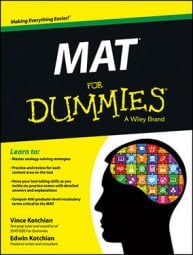Science and math aren't the most prevalent topics on the MAT, but they are tested. The biology topics listed here will help you prepare for the MAT by exposing you to the major subjects in the biology field that might appear on the test.
Biology terms that appear on the MAT test
Brush up on your biology by studying these terms and their definitions.
Abscission: Process by which an organism sheds a part of itself
Acclimatization: The process in which an organism adjusts to its surroundings
Aerobic organism: Organism that has an oxygen-based metabolism
Amino acid: Building block of proteins
Anatomy: Study of the structure of organisms
Arachnology: Study of arachnids (examples: spiders, scorpions)
Bacteria: Microorganisms without a cell nucleus
Bacteriophage: Virus that infects bacteria
Biochemistry: Study of chemical processes in living things
Biology: Study of life and living things
Botany: Study of plant life
Cell membrane: Barrier between a cell and its environment
Cell nucleus: Organelle in a cell containing genetic information
Chloroplast: Plant organelle that does photosynthesis
Chromosome: DNA and protein in cells, and contains genes
Cytoplasm: The gel inside of a cell that organelles are suspended in
Deciduous: Type of organism that sheds parts of itself
DNA: Nucleic acid with genetic instructions for reproduction
Ecology: Study of the relationship between life and its environment
Ecosystem: Community of living things
Egg: Place where an embryo begins to develop
Embryo: Earliest stage of multicellular life
Endemism: Life unique to a geographical area
Enzyme: Molecule that speeds up chemical reactions
Ethology: Study of animal behavior
Gene: Unit of heredity
Genetics: Science of genes and heredity
Herpetology: Study of amphibians
Histology: Study of microscopic anatomy
Ichthyology: Study of fish
Insulin: Hormone that regulates metabolism
Invertebrate: Animal with no vertebral column
Krebs cycle: Reactions by aerobic life to produce energy
Larva: Young form of animals before metamorphosis
Leukocyte: White blood cell; part of the immune system
Ligament: Tissue that connects bones to other bones
Lipids: Molecules, including fats and waxes
Mammalogy: Study of mammals
Marine biology: Study of ocean-based life
Meiosis: Cell division required for sexual reproduction
Microbiology: Study of microscopic life
Mitosis: Process in which chromosomes split into two identical sets
Mycology: Study of fungi
Neurobiology: Study of the nervous system
Oncology: Study of cancer
Ornithology: Study of birds
Osmosis: Movement of molecules through a membrane
Parasitology: Study of parasites and their hosts
Physiology: Study of the physical functions of organisms
Phytopathology: Study of plant diseases
Transcription: In genetics, the copying of DNA to RNA
Vacuole: Membrane-enclosed organelle in all plant cells
Virology: Study of viruses
Zoology: Study of the animal kingdom
Important figures in the field of biology
The following lists important people in the biology field you should become familiar with before taking the MAT.
Crick, Francis: English cofounder of DNA with James Watson
Darwin, Charles: English naturalist who proposed natural selection
Fleming, Alexander: Scottish biologist who discovered penicillin
Goodall, Jane: British expert on chimpanzees
Hippocrates: Ancient Greek father of Western medicine
Lamarck, Jean-Baptiste: French naturalist and proponent of evolution
Lister, Joseph: British surgeon who pioneered antiseptics
Mendel, Gregor: Founder of genetics who worked with pea plants
Pasteur, Louis: French microbiologist who invented pasteurization
Pavlov, Ivan: Russian scientist who worked with dogs to show a conditioned response
Sabin, Albert: American scientist who developed an oral polio vaccine
Salk, Jonas: American scientist who developed the first polio vaccine
Watson, James: American cofounder of DNA with Francis Crick

